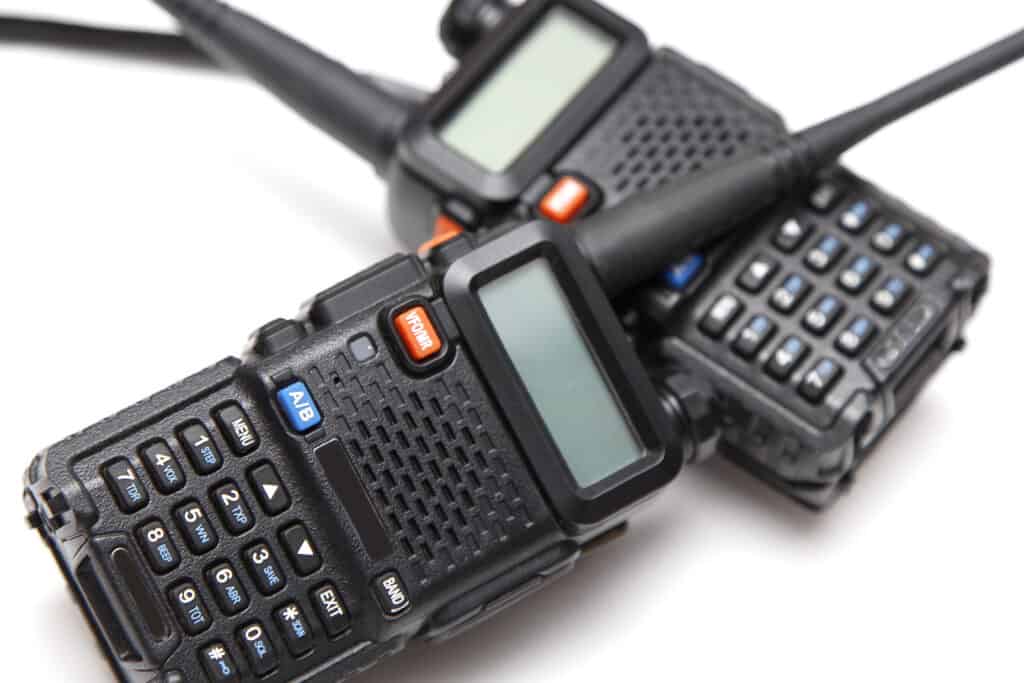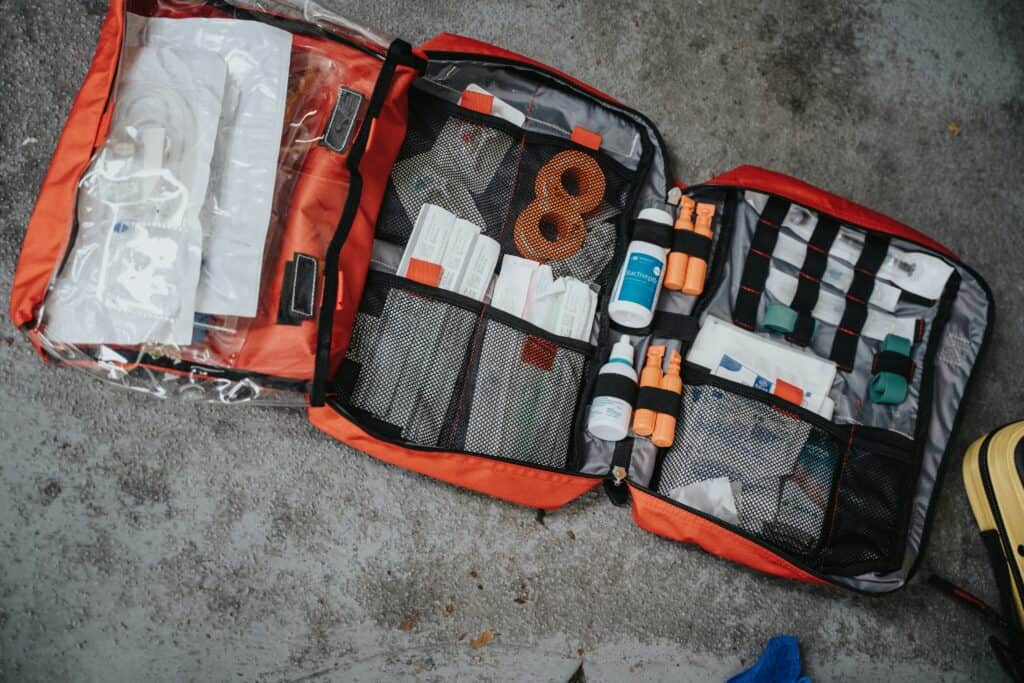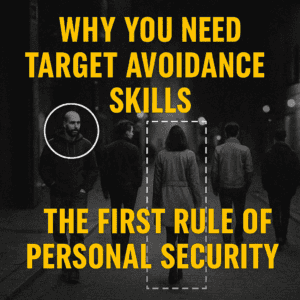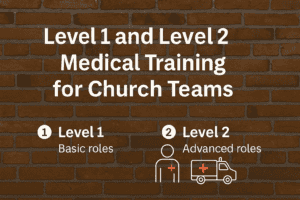Church security teams are responsible for ensuring the safety and well-being of their congregation members, staff, and visitors.
This safety mission can only be achieved through effective communication practices, both internally within the team and externally with other stakeholders.
A primary means of internal communication among church security team members is the use of two-way radios.
These devices allow for ease of information flow and quick decision-making, as team members can communicate with one another even when they are not within close proximity.
Modern two-way radios also include encryption, ensuring secure communication within the team.
Additionally, regular team meetings and collaboration can help establish clarity in roles and responsibilities, as well as create opportunities for team members to discuss and address concerns.
When it comes to external communication, security teams must maintain a professional and consistent relationship with local law enforcement, other security professionals in their community, and security consulting firms.
These internal and external resources can provide valuable insights and expertise, enhancing the skills and knowledge of church security personnel.
Furthermore, establishing clear communication policies is of paramount importance to a church security team.
Investing time in creating thorough guidelines for selecting team members, as well as procedures for internal and external communication, helps ensure the smooth functioning of the team.
Church security teams should also conduct background checks on potential team members and ensure they possess the appropriate skills for their roles.
Lastly, it is essential for church security teams to practice an adaptable and flexible approach when dealing with possible emergencies or security threats.
This may involve conducting regular drills and training sessions with team members and relevant stakeholders, as well as staying informed on the latest security trends and best practices.
Understanding the Role of Communication in Church Security
Effective communication is crucial for the success of any security team, and church security is no exception.
The primary goal of a church security team is to ensure the safety and well-being of the congregation, staff, and visitors while maintaining a welcoming and peaceful environment.
In order to achieve this, clear and consistent communication between team members and church leadership is necessary.
Roles and responsibilities within a church security team may include coordinating with staff and volunteers, monitoring the premises, handling emergencies, and liaising with external security providers and law enforcement.
Communicating these responsibilities and the expectations of each team member is essential for efficient operations, as it helps to establish protocols and promote accountability among the team.
When addressing internal communication, it is vital to select appropriate communication channels.
For instance, two-way radios can be a valuable tool for church security teams, as they allow for quick and encrypted communication with team members within the radio’s range.
In addition to in-person meetings, using multiple channels of communication can also ensure that different teams are well-informed and connected.
External communication, on the other hand, is focused on building relationships with external entities, such as other churches, law enforcement agencies, and emergency responders.
Coordinating with these stakeholders can provide valuable insights and resources that can enhance the overall security of the church.
Sharing information about potential threats, security measures, and emergency plans can help foster a collaborative approach to ensuring the safety of all during worship and church-related activities.
Effective communication is vital in both the internal and external aspects of church security.
By clearly defining roles and responsibilities, employing suitable communication channels, and collaborating with various stakeholders, a well-functioning and coordinated security team can be established.
Internal Communication Strategies
Establishing Clear Communication Channels
It is crucial to establish clear communication channels within the security team to ensure smooth coordination and flow of information.
This can be achieved by determining who the key individuals are in your church community and assigning specific roles within the team.
Adequate communication channels can include face-to-face discussions, email groups, instant messaging platforms, or two-way radios.
Regular Meetings and Briefings
Holding regular meetings and briefings helps keep team members informed of any updates, security protocols, or potential threats that may arise.
These gatherings foster a sense of cohesion and unity within the team and help to ensure that everyone is aware of their responsibilities.
Briefings can take different forms, such as routine check-in meetings, larger annual workshops, or emergency discussions when necessary.
Secure and Reliable Communication Tools
Utilizing secure and reliable communication tools is essential in maintaining the effectiveness of the security team.
These tools can include encrypted messaging apps, two-way radios, or security systems integrated with communication capabilities.
Implementing the latest technology will help ensure that vital information is conveyed quickly and efficiently while minimizing any potential breaches or communication lapses.
Training Team Members on Communication Protocols
Providing training to security team members on communication protocols and procedures is critical for effective team coordination.
Training should address various scenarios, such as emergency procedures, threat response, and general communication etiquette.
Additionally, refresher courses should be scheduled regularly to ensure that team members remain up-to-date on the latest best practices and are familiar with the church’s specific protocols.
Confidentiality and Information Sharing Policies
Establishing confidentiality and information sharing policies is crucial for maintaining the security team’s trust and protecting sensitive data.
It is essential to emphasize the importance of confidentiality when dealing with security-related information, ensuring all team members understand the consequences of sharing sensitive information inappropriately.
Policies should outline the procedures for sharing various types of information, specifying which team members are authorized to access certain data and under what circumstances information can be disclosed.
External Communication Strategies
Liaising with Local Law Enforcement
Establishing a strong relationship with local law enforcement is crucial for church security teams.
This collaboration ensures prompt and coordinated responses to emergencies.
Security teams should:
- Maintain regular contact with law enforcement representatives
- Share incident reports and security concerns
- Organize joint training sessions and emergency drills
- Keep local law enforcement informed about major church events
Communicating with the Congregation
Transparent communication with the congregation helps build trust and maintain a secure church environment.
Security teams can:
- Share updates on security measures and protocols
- Encourage congregation members to report any suspicious activities
- Keep them informed about emergency procedures
- Provide safety briefings before major events
Handling Media Inquiries

In cases of emergencies or incidents, media inquiries may be inevitable.
To maintain a positive public image, security teams should:
- Assign a designated spokesperson
- Offer accurate and timely information
- Maintain a neutral and professional tone
- Be aware of the church’s and congregation’s privacy rights
Public Relations: Crafting the Right Message
Build a strong online presence in order to control the narrative around your church’s security.
To craft the right message:
- Emphasize the security team’s commitment to safety
- Highlight collaboration with local law enforcement
- Showcase community engagement and security awareness initiatives
- Address potential concerns while respecting privacy policies
Community Engagement and Awareness Programs
Building partnerships with the church community is vital for improving security.
To foster stronger bonds, security teams can:
- Organize security awareness workshops for congregation members
- Collaborate with other churches and local organizations to share best practices
- Participate in local security initiatives such as neighborhood watch programs
- Offer safety tips and resources to the community through online channels
Crisis Communication Management
Developing a Crisis Communication Plan
A well-crafted Crisis Communication Plan is essential for church security teams to effectively manage emergencies.
This plan should include emergency response protocols, clearly defined roles and responsibilities, and guidelines for both internal and external communication.
To begin, assemble a crisis communications response team comprising:
- The senior pastor
- One or two staff members, including the communication officer
- A lay leader within the church
- Other members of the congregation if needed
Role of the Communication Officer During a Crisis
The communication officer plays a critical role in managing crisis communications.
Responsibilities include coordinating with the crisis communications response team, monitoring real-time information, and ensuring that consistent and accurate messaging is disseminated both internally and externally.
Internal Communication: The communication officer should utilize various channels like emails, phone calls, and intranet platforms to keep staff and congregation members informed.
External Communication: Similarly, the communication officer should handle external communication with the press, local authorities, and the community.
Real-Time Information Dissemination
During a crisis, it is crucial to provide real-time information to both internal and external audiences.
This may include:
- Providing updates on the situation and response efforts
- Sharing evacuation routes and safety measures
- Coordinating with first responders and local authorities
- Addressing misinformation and rumors
Post-Crisis Communication and Debriefing
Once the crisis subsides, the communication officer and crisis communications response team should collaborate on:
- Assessing the effectiveness of the Crisis Communication Plan
- Documenting the crisis details, related communications, and outcomes
- Conducting a debriefing session to discuss lessons learned and identify areas for improvement
- Updating the plan accordingly based on the insights gained
Proper management of crisis communication is crucial for maintaining an organized and effective response during emergencies.
By following these best practices, church security teams can ensure the safety and well-being of their congregation members and staff.
Technology in Communication
In this digital age, technology plays a vital role in enhancing the internal and external communication of church security teams.
Let’s discuss the use of social media, mobile apps, and mass notification systems in fostering better communication and coordination among team members and the congregation.
Leveraging Social Media for Security Updates
Social media platforms are an excellent tool to keep the church community informed about security updates and maintain an online presence.
By creating dedicated accounts for church security on platforms like Facebook, Twitter, and Instagram, the security team can promptly share important updates, warnings, and emergency information with the congregation.
Engaging with the community through social media also helps in building trust and enhances the overall efforts of the security team.
The Role of Mobile Apps in Team Coordination
Mobile apps have become an essential means of communication and coordination among teams, including church security teams.
Apps like Church Community Builder, Slack, or other team communication tools can significantly improve team coordination by providing a dedicated platform to share information, schedules, training material, and real-time updates.
These apps enable efficient communication among team members, regardless of their physical location, allowing for quick decision-making in emergencies.
Advantages of Mass Notification Systems
Mass notification systems are powerful tools for church security teams to communicate critical information to the congregation during emergencies.
These systems can send out alerts via a variety of communication channels, such as text messages, emails, or phone calls, to ensure that the information reaches a wider audience.
Some key benefits of using mass notification systems include:
- Instant communication during emergencies, such as an intruder or natural disaster
- Ability to target specific groups or areas based on the nature of the threat
- Offering multiple communication channels to fit the preferences of individual congregation members
- Keeping the congregation updated with the latest security measures and protocols
Incorporating technology in church security communication can lead to better teamwork, informed congregation, and swift responses in emergencies.
Training and Drills
Scenario-Based Communication Training
One of the best practices for church security teams is to conduct scenario-based communication training.
This type of training helps security team members practice communication skills and make informed decisions in simulated situations they may face during their duties.
Examples of such scenarios could include responding to a suspicious person, handling medical emergencies, or dealing with an active shooter incident.
By utilizing both internal resources such as experienced security professionals within the church community and external resources like security consulting firms or law enforcement agencies, diverse perspectives and expertise can be incorporated during these scenarios.
The Importance of Drills for Effective Communication

In addition to scenario-based training, ongoing drills play a crucial role in ensuring effective communication among church security team members.
Drills help reinforce the principles and processes learned during communication training, and they can address topics such as hands-on firearms competency, de-escalation practices, and various scenario-driven exercises.
Moreover, regular drills can help cultivate partnerships with local law enforcement, ensuring a cohesive response in the event of an emergency.
Some suggested formats for communication drills include:
- Tabletop exercises: Group discussions centered around a specific scenario, enabling team members to familiarize themselves with communication protocols and decision-making processes.
- Role-playing: Participants assume various roles within a simulated scenario, allowing them to practice their communication skills in different situations.
- Full-scale exercises: Simulated emergency situations with high levels of realism, testing the security team’s ability to communicate and collaborate with each other and external partners.
Assessing Communication Efficacy Post-Drills
After conducting drills, it is vital to assess the communication efficacy of the security team.
This post-drill assessment helps identify areas for improvement and ensures the ongoing development of effective communication skills.
Some methods for assessing communication efficacy include:
- Debriefing sessions: After each drill, hold a debriefing session where participants can discuss their experiences, identify strengths and weaknesses, and share suggestions for improvement.
- Surveys and feedback forms: Collect anonymous feedback from participants to identify common issues and gauge overall satisfaction with the drill and training.
- Data analysis: Analyze any data collected during the drill, such as response times, communication logs, or incident reports, in order to identify trends and areas for improvement.
By implementing these best practices in training and drills, church security teams can strengthen their internal and external communication, ensuring a well-coordinated and effective response during any potential security-related incident.
Legal Considerations and Compliance
When it comes to church security teams, there are various legal considerations that need to be taken into account.
In this section, we explore the key aspects of privacy laws and regulations, along with compliance with local and national safety standards.
Understanding Privacy Laws and Regulations
Privacy laws and regulations play an essential role in church security.
It’s important for security teams to understand the balance between protecting the congregation and respecting individual privacy.
Church security teams should be familiar with applicable privacy laws, such as the Health Insurance Portability and Accountability Act (HIPAA) for sensitive health information, and the Family Educational Rights and Privacy Act (FERPA) for student records if a church has a school on its premises.
Moreover, these teams need to ensure they comply with general data protection regulations when gathering, storing, and processing personal information.
In doing so, they must also establish protocols for sharing information with law enforcement agencies and other external parties.
All members of the security team should receive regular training on privacy laws and any updates on regulatory changes.
Compliance with Local and National Safety Standards
Church security teams must also comply with local and national safety standards, such as building codes, fire regulations, and emergency preparedness. T
his includes having proper fire detection and suppression systems in place, conducting regular safety drills, and coordinating with local fire departments.
Additionally, churches need to consider any specific requirements or protocols established by law enforcement for situations such as lockdowns, evacuations, or shelter-in-place scenarios.
By working closely with local authorities, church security teams can ensure a seamless response to emergency situations.
Conclusion and Best Practice Recap
Summary of Key Communication Strategies
Effective communication is essential for church security teams, so it’s important to establish various methods to promote clear and concise information sharing.
Some key strategies include:
- Utilizing two-way radios for instant communication during emergencies or events
- Incorporating secure digital platforms for team-wide messaging and announcements
- Regular debriefings and post-event meetings to discuss performance and areas of improvement
- Partnering with external resources, such as law enforcement agencies or security consultants, for guidance and expertise
Continuous Improvement and Upkeep of Communication Skills
To maintain high standards within church security teams, continuous improvement of communication skills should be a priority.
Some ways to achieve this include:
- Conducting regular team training and drills, focusing on both verbal and non-verbal communication techniques
- Providing ongoing feedback to team members and encouraging open dialogue for improvement
- Holding workshops to develop effective communication skills
- Updating communication procedures and protocols to ensure they remain relevant and efficient
Frequently Asked Questions
What are effective communication methods for church security teams?
Effective communication methods for church security teams include walkie-talkies or radios for instant communication during services and events, as well as private messaging platforms for sharing sensitive information. Additionally, in-person meetings and debriefings can help teams stay informed and collaborate on strategies. Developing standard operating procedures for communication can further enhance efficiency and coordination within the team.
How should a church security team engage with external stakeholders?
To engage with external stakeholders, such as law enforcement, community organizations, and neighboring churches, church security teams can establish partnerships and share best practices. Active involvement in local security groups and communication with first responder agencies can aid in emergency preparedness. A clear channel of communication between security team members and external stakeholders can facilitate a coordinated response to security incidents.
What training topics are crucial for a church security team?
Crucial training topics for church security teams include basic first aid and CPR, de-escalation techniques, threat recognition, emergency response procedures, and proper use of security equipment and technology. Regular training and drills can ensure team members stay up-to-date on skills and response protocols.
How can a church security team create a clear and actionable mission statement?
A clear and actionable mission statement should include the team’s purpose, objectives, and commitment to the safety and well-being of the congregation. It should be concise, communicate the scope of the team’s responsibilities, and establish guiding principles for decision-making. The mission statement should emphasize the importance of maintaining a welcoming environment while also ensuring the security of church members and visitors.
How can a church security team develop a comprehensive security plan?
A comprehensive security plan should address both internal and external threats, incorporate best practices, and be tailored to the specific needs and resources of the church. The plan should include detailed protocols for emergency response, regular assessments of threats and vulnerabilities, and training programs for security team members. Involving all stakeholders in the development process can ensure the plan is effective, comprehensive, and well-supported by the entire church community.









